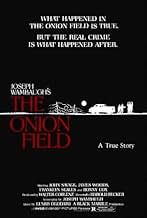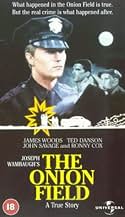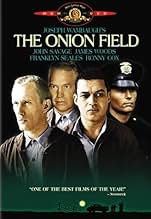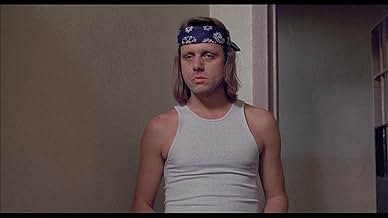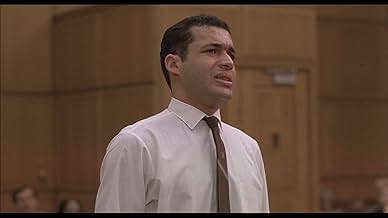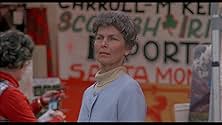Un policier est assassiné dans les champs d'oignons à Bakersfield. Cependant, des lacunes juridiques pourraient empêcher ses ravisseurs de recevoir justice, et son partenaire est hanté par l... Tout lireUn policier est assassiné dans les champs d'oignons à Bakersfield. Cependant, des lacunes juridiques pourraient empêcher ses ravisseurs de recevoir justice, et son partenaire est hanté par la culpabilité écrasante du survivant.Un policier est assassiné dans les champs d'oignons à Bakersfield. Cependant, des lacunes juridiques pourraient empêcher ses ravisseurs de recevoir justice, et son partenaire est hanté par la culpabilité écrasante du survivant.
- Réalisation
- Scénario
- Casting principal
- Récompenses
- 1 victoire et 3 nominations au total
- Helen Hettinger
- (as Diane Hull)
- Greg's Woman
- (as 'Beege Barkett')
Avis à la une
This gripping first half, however, gives way to a more pedestrian-- though well-meaning-- second half that could use faster pacing and narrower focus. For example, what's the point of showing us Hettinger placing plants in his pick-up and then driving off. The scene consumes about 30 seconds of pointless screen time since we already know that gardening is returning him to mental health. At the same time, the screenplay pursues a number of diverse threads that tend to divide audience interest instead of concentrating it.
The film is ex-cop Wambaugh's personal project, and it's clear he uses the case to illustrate certain aspects of the criminal justice system. Not surprisingly, the appeals process comes in for special scorn. Shrewd cop-killer Powell is able to manipulate both court proceedings and the appeals process in seemingly endless fashion for his own advantage. Wambaugh is also in sympathy with the unlucky Hettinger who's been scapegoated for his partner's death. That scene where the beat cop exposes the unreality of a departmental rule is a little gem and also, I suspect, Wambaugh speaking through the actor.
Anyway, that first half amounts to a minor masterpiece of criminal derangement brought to life by Woods' unforgettable performance.
The story was not just a typical cop story where the cops always win. Rather, it was a story of the tragedy of a lost life, the broken life of another, and the tragic lives of two pathetic, small time killers who would spend the majority of their lives in and out of prison. It was this case that changed Los Angeles police policy from that time on.
The cast was little known at that time. Who would have thought Ted Dansen would go on to TV fame? Who would have thought James Woods would become a big screen actor? The rest of the cast, including John Savage and the late Franklyn Seales would remain a part of the landscape and gain their own fame.
As for Wambaugh, he is one of my favorite writers because of all of the great cop projects he would do: "The Blue Knights," "Police Story" and others.
Some days I really wish for dramas like those especially in these days of mistrust of cops...hey, it's a tough job laying down your life every day of your life. A movie like this might open the eyes of many and change some attitudes.
With a plot that is direct and easy to follow, "The Onion Field" tells this story in a straightforward manner. There are almost no plot twists or turns. And the film has a breathtaking sense of authenticity. Indeed, the film's kidnapping scene takes place at the intersection of Carlos and Gower, the exact location where the real life kidnapping occurred.
The film's pacing is rather slow. Scenes tend to be lengthy, with emphasis on character development. The first half gives us a snapshot of the everyday lives, both of the cops and of the two thieves. It also describes the kidnapping incident that brought them together, and the ordeal on the deserted road. Much of the second half takes place in a courtroom setting, as we see how the criminal trial plays out. This second half of the film renders a scathing indictment of the American judicial process.
The film's cinematography is fine, if perhaps somewhat dark. The background music is low-key and appropriately ominous. Production design is adequate.
Based on Joseph Wambaugh's book, the screen story itself is the strength of the film. But the acting also is quite good. James Woods, Franklyn Seales, and Ted Danson are all convincing in their roles. John Savage gives a great performance too, despite his tendency to talk as if he's got marbles in his mouth.
Fact-based films have an inherent advantage over fictional films, in my opinion. And, "The Onion Field" is made with such authenticity, with such a sense of purpose and dedication, it easily makes my list of the best crime films of the 1970s.
Le saviez-vous
- AnecdotesFranklyn Seales' screaming during the murder was unscripted.
- GaffesWhen Karl Hettinger is talking into the patrol car microphone, the microphone is turned around and he is actually talking into the back of it.
- Citations
Det. Sgt. Pierce R. Brooks: Has your conscience ever bothered you? Like feeling - guilty?
Jimmy Smith: Mr. Brooks... I believe... I think that is something that rich white guys dreamed up to keep guys like me down. I honestly don't believe there is such a thing... such a feeling. Guilty? That's just something the Man says in court when your luck runs out.
Meilleurs choix
- How long is The Onion Field?Alimenté par Alexa
Détails
- Date de sortie
- Pays d’origine
- Langue
- Aussi connu sous le nom de
- The Onion Field
- Lieux de tournage
- Carlos Avenue & N. Gower Street, Hollywood, Los Angeles, Californie, États-Unis(actual site of the officers' abduction)
- Société de production
- Voir plus de crédits d'entreprise sur IMDbPro
Box-office
- Budget
- 2 000 000 $US (estimé)
- Montant brut aux États-Unis et au Canada
- 9 890 597 $US
- Montant brut mondial
- 9 890 597 $US
Contribuer à cette page


